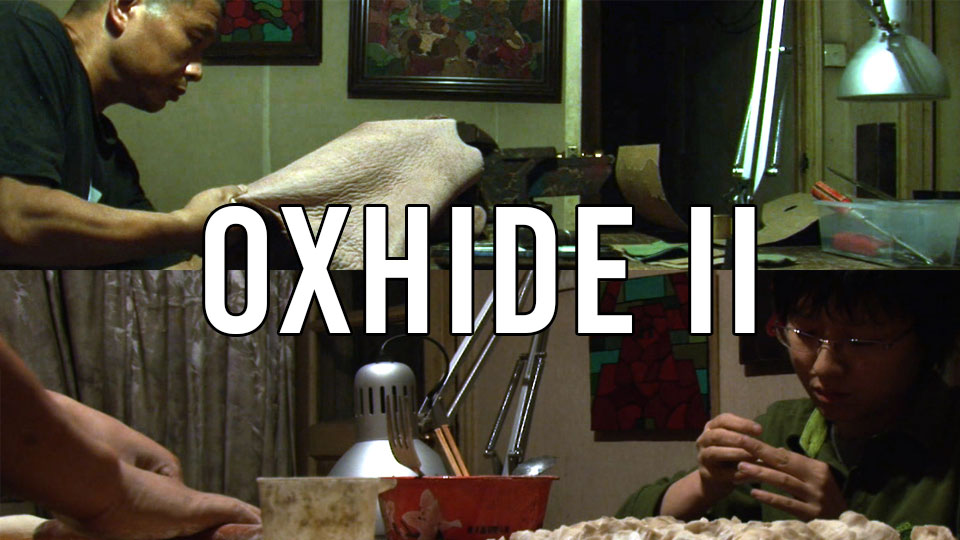
The Slow Craft of Oxhide II
A review by Alex Fields.
In Oxhide I & Oxhide II, filmmaker Liu Jiayin takes us into a cramped Beijing apartment, casting her parents and herself as fictionalized versions of themselves. In the following post, film critic Alex Fields pays particular attention to the second installment, wherein the director fixes her camera around the kitchen table to allow for a rigorously minimalist story in real time, through the preparation of Chinese dumplings together.
Twelve minutes into the film’s first scene—a single take of the filmmaker’s father working quietly at his table on leather handbags—come the first lines of dialogue. “That was quick,” the dad says as mom comes home. “Quick? It took over an hour.” “I guess I’m the slow one then.” Ten minutes later, this first shot concludes with the couple moving the table around to start preparing dinner, placing it exactly symmetrically in front of the camera and revealing that slow, careful craft is not just the film’s subject matter, but its form.
Liu is a master of exact compositions that reveal their clever precision and simple beauty over the course of long takes. A new person enters the frame and alters its fundamental balance, an object stationary for several minutes is moved or comes into use, and the image is rigorously recomposed in real time. Hands and work are always visible but visual access to faces is carefully controlled through the edges of the frame and the placement of objects which manage space inside the frame. The shots may be long and stationary but they are hardly static. Many artists in the era of slow cinema have worked with takes of this duration but few have understood so well how to manage them.
The first cut comes at 23 minutes and it’s a 45 degree readjustment of the camera angle over the same table, with only a quick break in continuity. The entire film consists of these reframings of work in the same room, two hours to make some dumplings, a couple minutes to eat them, and a decision to go for a walk. It’s a more focused approach than the first Oxhide, more committed to its radical structure. It’s more clearly staged and scripted than the first film as well, which paradoxically becomes a source of humor as Liu constantly delivers self-commentary on her themes and formal choices. Her dad instructs gives instructions for the exact amount of green onions for the recipe, and when her mom say the onions should be cut to four millimeters, Liu fetches a ruler to measure each slice. Later they’re comparing their dumplings, which Liu says are a reflection of their maker’s personality; her dad says his daughter’s freestyle dumplings are “contemporary art.”
The family’s periodic banter provides political commentary about the disruption of artisanal production by crass market forces, how modern customers are attracted by the idea of discount and not by artistic worth. Liu asks whether a customer who consumes art on such commercial terms is better than no customer at all. Process is all important here, the final product worthy for its embodiment of that craft and not for its monetary or functional valuation. There’s something irreplaceable about creating a meal or a handbag or a film through slow care and attention and passing that tradition through generations. When mom tears the dough it makes a sound, the sound of mastery of an apparently simple set of motions. This isn’t a recipe but a philosophy of life and attention, and a critique of commodification.
Oxhide II mostly abandons even the minimal narrative documentary pretensions of Oxhide. The parents mention their anxiety over getting a new lease from their shop’s landlord and discuss fears of the shop closing, but that’s the extent of any reference to events off camera, and it’s more a framework for philosophical and political discussion than a plot that develops or creates and resolves tensions. Time is condensed to perceptual time, there’s no passing of the days or weeks. Instead the film leans into the demonstrative power of form, which for me is what makes it the more singular and greater of the two.
Watch OXHIDE I & OXHIDE II Courtesy the dGenerate Films Collection on OVID here.
Alex Fields has written for Tone Glow, In Review Online, and Ultra Dogme, among others.
Their substack focuses on formalist and experimental film. Follow them on Twitter and Letterboxd.
They live in Knoxville, TN.

Leave a Reply